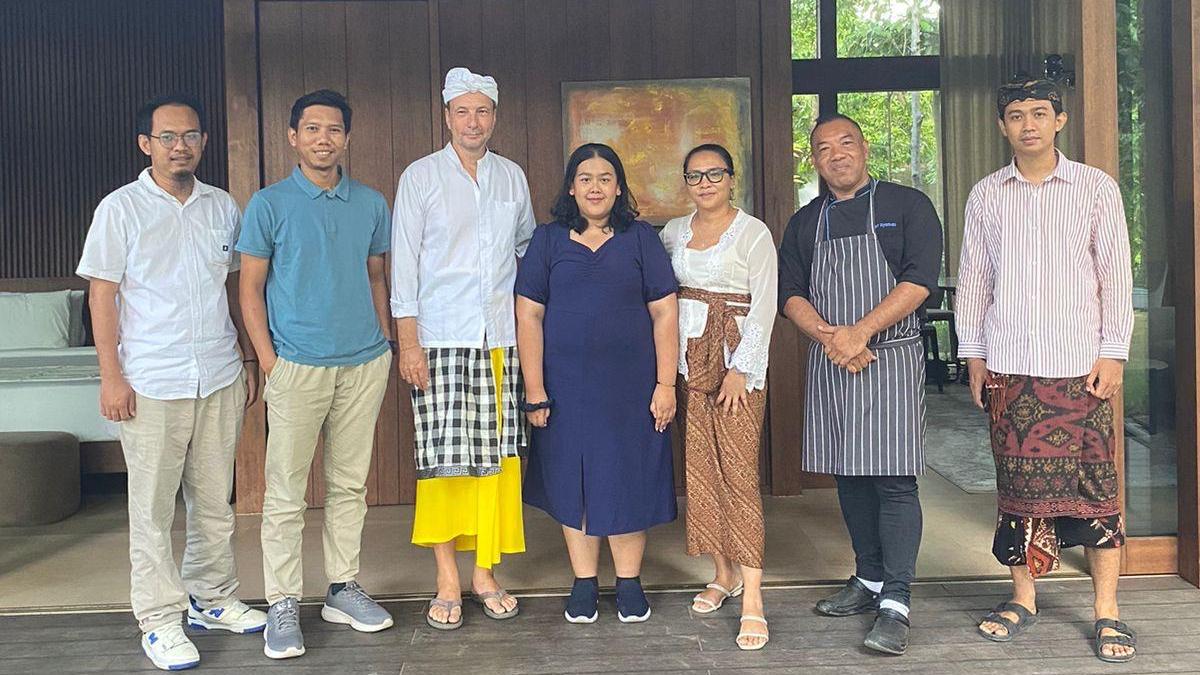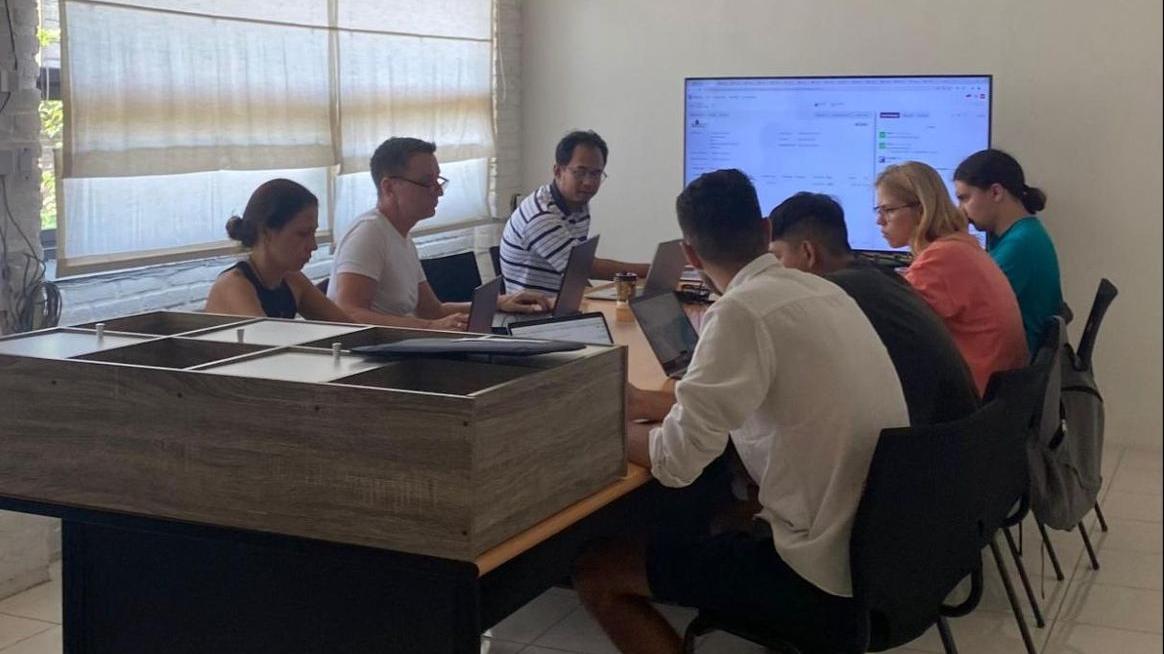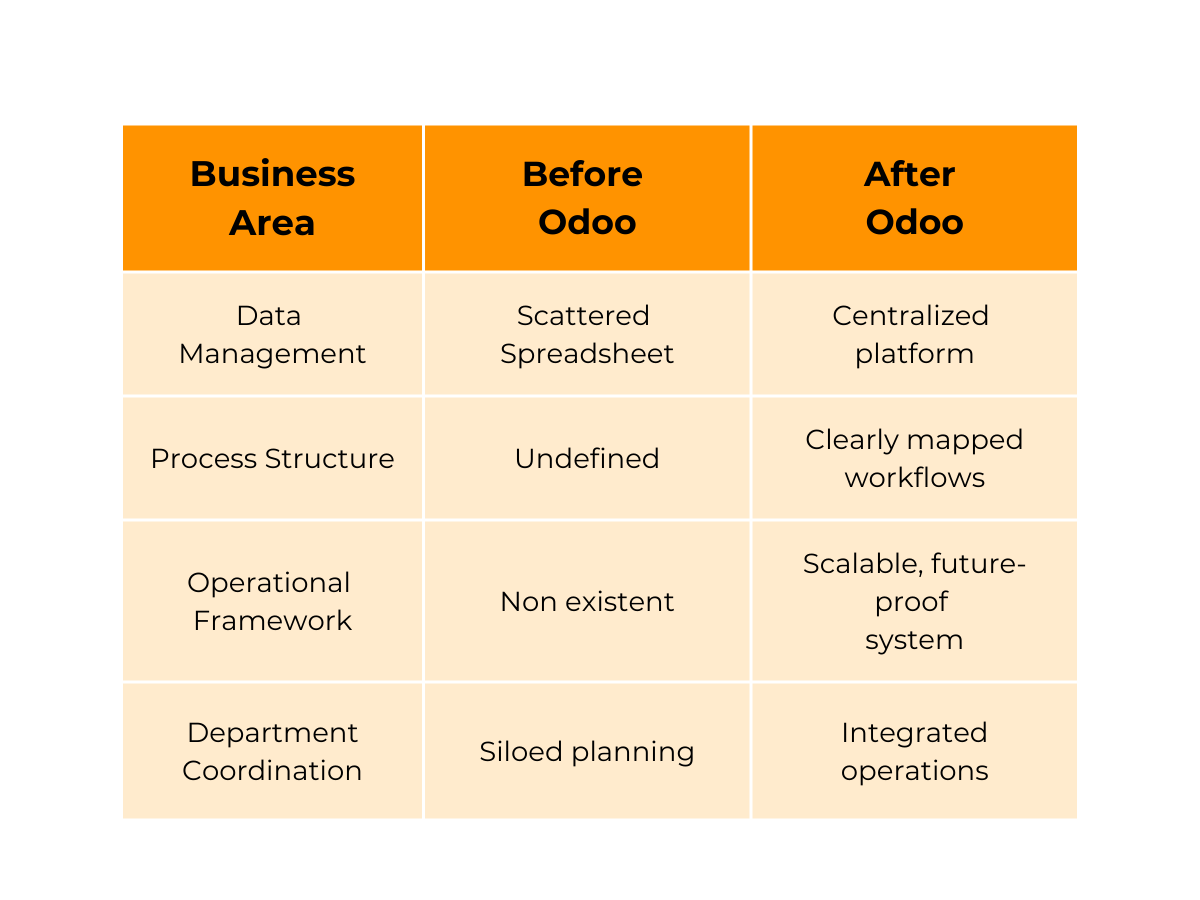Let’s explore how Okeara, a premium hydrogen-infused mineral water startup, overcame the challenge of having no established processes by implementing Odoo ERP before operations began. Through our 5-month phased implementation, they established structured business workflows, integrated payment and logistics systems, and created a scalable foundation for future growth—all before producing their first bottle.

- Company Name: PT Elementis Smart Technology (Okeara)
- Industry: Premium Hydrogen-Infused Mineral Water Production
- Location: Ubud, Bali
- Company Size: <50 Employees
- Current Scale: Newly established company
- Time of Implementation: September 2024 - January 2025
Systems Implemented: Sales, Purchase, Inventory, Accounting, Manufacturing, E-commerce.
For companies that have been operating for years, digital transformation is often about optimizing or replacing outdated systems. But for Okeara, the challenge was different—there were no established business processes yet.
With no prior operational history, Okeara needed to structure every aspect of its business, from procurement and production to sales and finance, to lay the foundation for sustainable growth.
Okeara invested in Odoo ERP to support their growth, but external regulatory delays prevented them from launching operations as planned. This gap between system readiness and operational readiness created uncertainty, requiring a strategic approach to ERP implementation.
Without established workflows, Okeara needed more than just an ERP system. They required a structured approach to defining and executing their business processes while ensuring system efficiency from the outset.
From Blank Slate to Business Blueprint: Okeara's Unique Implementation Challenges
Unlike companies migrating from legacy systems, Okeara's challenge was not improving outdated processes, but rather establishing effective business workflows from the ground up.
Some of the key obstacles they faced included:
- Lack of Predefined Processes – As a newly established business, Okeara had no existing workflows to replicate. Every aspect of their operations, from procurement to sales, needed to be defined and structured from the start.
- Regulatory and Licensing Delays – Although Okeara's Odoo system was ready for implementation, their operational launch was delayed due to external non-technical factors, such as securing business permits and compliance approvals. This created a gap between system readiness and actual usage.
- Uncertainty in Production Execution – As a newly established manufacturer, Okeara was still in the trial phase of its production process, meaning the technical requirements were not yet finalized. This made it challenging to define clear ERP configurations to support their evolving operations.
Okeara required a structured ERP implementation approach to overcome these uncertainties that could adapt to evolving business needs while ensuring operational alignment.
Strategic ERP Implementation: How Okeara Went Live in Two Phases

Recognizing Okeara's unique challenges, Portcities designed an adaptive, two-phase ERP implementation strategy to align with their evolving operational requirements and ensure a seamless transition to the new system.
Phase 1: Establishing Core Business Functions (Sept–Nov 2024)
The first phase focused on setting up essential business operations to enable initial transactions and operational activities. Key modules implemented:
- Sales & E-Commerce – Building an integrated e-commerce platform to establish a seamless digital sales channel.
- Inventory Management – Creating a structured inventory tracking system for raw materials and finished products.
- Purchase Management – Developing procurement processes to ensure efficient and reliable material sourcing.
Phase 2: Expanding to Financial and Manufacturing Operations (Nov 2024–Jan 2025)
Once the foundational systems were in place, the second phase introduced:
- Accounting & Financial Management – Establishing comprehensive financial tracking and reporting capabilities to provide real-time visibility.
- Manufacturing Process Integration – Creating production workflows with inventory and procurement to ensure seamless and efficient manufacturing execution.
This structured approach allowed Okeara to gradually adopt Odoo without the pressure of having fully defined processes from day one.
Connecting the Dots: Integrating Payments & Logistics with Odoo
To create a complete business ecosystem, Okeara required integrations with external systems to further enhance efficiency and automation to support transactions and logistics. Portcities implemented:
- Payment Gateway Integration (Xendit) – Enabling secure and automated online payment processing to streamline e-commerce transactions.
- Logistics API Integration (RajaOngkir) – Integrating real-time shipping rates and automated order fulfillment to enhance delivery efficiency and customer experience
These integrations created a fully automated and connected ecosystem reducing manual workload and improving service reliability.
Adapting to Evolving Needs: Embracing Uncertainty with Odoo
While the ERP implementation itself was structured, Okeara’s evolving operational status created ongoing challenges, particularly in defining manufacturing workflows. Since production was still in the trial phase, it was difficult to determine the exact process requirements in the early stages.
How Portcities Addressed These Challenges:
- Leveraging Odoo's Flexible Processes – Rather than waiting for finalized manufacturing workflows, Okeara adopted Odoo's standard manufacturing procedures, which could be later refined based on operational learnings and evolving requirements.
- Implementing Adaptable ERP Configurations – Portcities designed the Odoo system with flexible configurations to easily accommodate future adjustments as Okeara's business matured.
- Aligning with Odoo Best Practices – By guiding Okeara to align their workflows with industry-proven Odoo best practices, Portcities helped the company avoid common inefficiencies and reduce process complexity.
This pragmatic approach allowed Okeara to move forward with its ERP adoption without being held back by operational uncertainties.
Building for the Future: Okeara's Foundation for Growth

Despite being in the early stages of operations, Okeara's Odoo implementation has already delivered significant benefits:

- A Centralized and Structured Business System – Okeara has consolidated all their business data within a single, structured Odoo ERP platform, replacing scattered spreadsheets and manual tracking.
- A Future-Proof Operational Framework – Okeara's Odoo implementation was designed to adapt to their evolving needs, ensuring long-term scalability and growth.
- Integrated Sales, Inventory, and Finance Processes – The seamless coordination between procurement, inventory, and financial reporting has eliminated operational bottlenecks and improved data accuracy.
The Path Forward: Scaling Okeara's Success with Odoo
With a fully integrated Odoo ERP system in place, Okeara is now positioned to scale its production and sales operations without disruption. Portcities continues to provide ongoing support and system enhancements, ensuring that as the business grows, its ERP system evolves alongside it.
Okeara's journey demonstrates that a successful ERP implementation is not just about automation but about building a structured foundation to support long-term business growth and transformation.
Starting Fresh or Modernizing Legacy Systems - We Can Help
Whether you're a new company like Okeara establishing your first business systems, or an established business looking to modernize outdated processes, Portcities can design and implementation approach that meets your unique needs.
If your business wants to establish a scalable, fully integrated ERP system to drive growth and efficiency, Portcities can help by contacting us today to explore how Odoo can support your transformation journey.